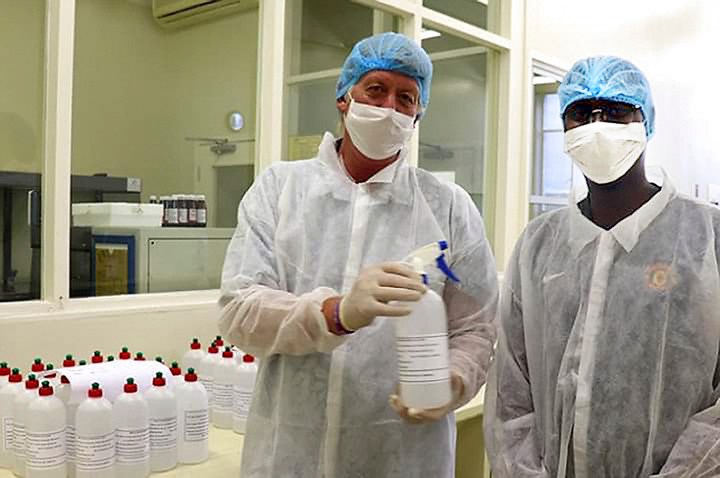Maverick Citizen Eastern Cape
Project helps rural communities gets their hands on sanitisers

Rhodes University and the Eastern Cape Department of Rural Development and Agrarian Reform (DRDAR) are working together to make sure more people have access to hand sanitiser to limit transmission of Covid-19.
Professor Rod Walker of the pharmacy faculty at Rhodes University explains that in response to the need for hand sanitiser, a team of the university’s scientists “set up a lab in partnership with the DRDAR to produce a top-of-the-range hand sanitiser for the benefit of farmworkers and rural communities within the province”.
He says the hand sanitiser is made from ethanol, glycerol, hydrogen peroxide and sterile water, and that it meets specifications set by the World Health Organisation.
“It is a relatively simple product to make, but the actual amounts used are critical to ensure the product will be effective,” he explains. “The alcohol percentage of the sanitiser is checked at the end of the process to ensure it falls into the specifications set.”
Walker and his colleagues at Rhodes trained a team of eight technicians from the Dohne Agricultural Development Institute in the small rural town of Stutterheim.
The Stutterheim team scaled up quickly and is now producing between 600 and 900 litres of hand sanitiser a day.
“Obviously the ability to produce is a function of the availability of the raw materials,” says Walker. “The production follows very stringent protocols and the process is recorded at all times to ensure traceability and confirmation of quality.”
Dr Mfundo Maqubela, director of the Dohne Agricultural Development Institute, says the specialised training to produce hand sanitiser was motivated by a high demand among people working on farms, rural people and poor communities across the province. He says they realised that some rural communities were experiencing a shortage of water caused by drought, and that this could impact handwashing.
Maqubela says, “The sanitisers will be distributed to all districts in the province, then districts will distribute it to officials working in local and ward offices. This approach will ensure that sanitisers reach the intended communal areas and people.”
“The Department will prioritise places with high poverty levels, where access to water and sanitisers are a challenge. The intention is to ensure that every household has enough sanitiser to take care of the whole family,” says Maqubela.
According to Nomakhosazana Meth, Eastern Cape MEC for DRDAR, the hand sanitisers initiative is a move to ensure the safety of vulnerable people and workers in the agricultural sector.
“During my visit across the province, to check the compliance of farms in respect of the regulations set to curb the spread of virus, we noticed that farm owners observe the regulations, but some still need to be supported with protective personal equipment and sanitisers,” says Meth.
Eastern Cape Department of Health Superintendent-General, Dr Thobile Mbengashe, welcomed the initiative. “We’re thankful to the university for responding to the call for everyone to come together and make efforts in solidarity against the Covid-19 pandemic, by producing sanitisers to be distributed to our communities.” DM/MC
This article was produced by Spotlight – health journalism in the public interest. Like what you’re reading? Sign up for our newsletter and stay informed.
"Information pertaining to Covid-19, vaccines, how to control the spread of the virus and potential treatments is ever-changing. Under the South African Disaster Management Act Regulation 11(5)(c) it is prohibited to publish information through any medium with the intention to deceive people on government measures to address COVID-19. We are therefore disabling the comment section on this article in order to protect both the commenting member and ourselves from potential liability. Should you have additional information that you think we should know, please email [email protected]"





 Become an Insider
Become an Insider